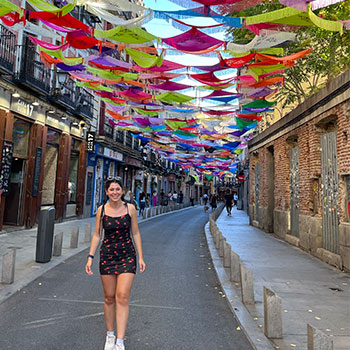We use cookies on this site to enhance your experience.
By selecting “Accept” and continuing to use this website, you consent to the use of cookies.
The student exchange program allows you to study abroad for a term or full academic year at one of 70 exchange partner institutions around the world.
The exchange application is now open! The exchange deadline is January 12th, 2026 at 4:00p.m. EST.
We support you every step of the way with support and guidance before, during and after the application process, as well as with pre-departure sessions and gatherings for returning exchange students.
Visit the International Opportunities Fair in the Concourse on Wednesday October 1, 2025 from 11:00 a.m. to 3:00p.m. to meet exchange students and learn more about the program!
On this page:
Travelling abroad has many personal benefits like learning about other cultures, meeting people from around the world, and challenging yourself. There are also career benefits as you can network while abroad, as well as demonstrate to employers that you are resilient and a capable problem-solver.
Studying abroad helps you gain a new perspective about your field of study and experience a new way of learning.
 Maya’s favourite part of exchange was meeting different people with various personalities, cultures, and backgrounds. It great to go into a situation without knowing anything or having much planned because it is a fresh start.
Maya’s favourite part of exchange was meeting different people with various personalities, cultures, and backgrounds. It great to go into a situation without knowing anything or having much planned because it is a fresh start.
Explore and research our partner institutions to discover where you can study abroad. You have a high chance pf being placed with an institution as there are up to eight spots in each of our 70 institutions.
Here are some things to consider when choosing an institution for an exchange:
You can go on exchange in your third, fourth or fifth year. The general requirements to go on exchange are:
Review the information below for other requirements that you may need to meet.
Eligible to study abroad but will pay international student fees to Laurier.
You must investigate the implications to your study permit and visa requirements to travel to the host country. Contact an International Student Advisor for more information and guidance.
You can choose one study abroad term unless you choose to do a co-op work placement abroad for a second term. There are more opportunities to go abroad in the fall because there are more partner institutions with corresponding term dates.
Contact your co-op coordinator to determine the best time to go on exchange.
You are eligible to go on exchange, but you must be enrolled in full-time studies at the host institution. An exception is if you are registered with Laurier's Accessible Learning Centre for a reduced course load, then you may take a reduced course load on exchange and pay your usual tuition instead of full-time tuition for your exchange term.
Check your program requirements because some programs may have specific requirements and/or restrictions when it comes to an exchange.
You are eligible to study abroad during your fourth or fifth year. It is not possible to go on exchange in your third year.
You are eligible to study abroad, and recommended that you do so during your third year.
As a double-degree with UW, you can apply to both UW and Laurier exchanges if you wish, or just one or the other. You should:
For double-degree BBA students going through Laurier's Student Exchange Program, regarding courses on exchange, Laurier International recommends you to:
 Amy recommends that anyone thinking of going on exchange to just do it, because you do not want to miss out on all that the world has to offer.
Amy recommends that anyone thinking of going on exchange to just do it, because you do not want to miss out on all that the world has to offer.
Before you apply for the student exchange program, you must attend the information session.
These sessions are hosted in person and virtually to provide you with more information about the program.
The upcoming sessions are listed here and more will be announced shortly.
Other resources you can refer to include:
To help you prepare for the student exchange program, you can consult with support areas with any questions you have.
The student abroad advisor (Waterloo campus) and global engagement coordinator (Brantford campus) can help with the following:
Your academic advisor can help with:
If you're in co-op:
Laurier is committed to making your participation in the student exchange program safe, accessible and responsive to your needs, such as:
When you inquire about exchange opportunities:
You can connect with Accessible Learning about exchange opportunities. A consultant can:
After you are accepted to the Student Exchange Program, if you are registered with the Accessible Learning Centre for a reduced course load, please email exchange@wlu.ca to confirm what your usual course load is. Laurier International will inform Service Laurier so you are billed tuition for your usual reduced course load.
If you would like to take a reduced course load on exchange and are not registered with the ALC, please email exchange@wlu.ca to learn about your options.
Some host institutions may offer on-campus accommodations. Make note that:
Your host institution will suggest housing locations and property management companies to help you start your housing search. Many students live off-campus while on exchange, and often with other exchange students.
Laurier tuition: You must pay full-time tuition and fees to Laurier based on 2.5 Laurier credits per term while you are on exchange. If you are registered with Laurier's Accessible Learning Centre to take a reduced course load then you will pay your usual reduced course load tuition while on exchange. If you take more than 2.5 credits, there will be additional fees.
Partner institution fees: There may be some incidental fees to pay at the partner institution like a bus pass, gym pass, etc. You may be required to buy health insurance from the host institution.
Laurier International fees: There is a $30 application fee to apply to the Student Exchange Program. If you are offered an exchange placement, there is a $110 placement fee to secure your space in the program.
As you do your research on exchange destinations, make sure you take extra costs in addition to tuition and fees into consideration (e.g., flights, accommodations abroad, passport and visa expenses, emergency funds, local transportation, immunizations, etc.).
You have some financial assistance options to help fund your exchange:
When you're ready to apply, you'll find the application and all supporting documents in Journey, Laurier's system for travellers.
These key dates and deadlines will help you plan when you will study abroad. Applications are typically due in January for exchanges occuring in the following academic year.
Jump to dates and deadlines for exchanges in the following term:
Before you submit your application, prepare all the components that are essential to your application including: Exchange Course Planning Tool, passport copy, Laurier student exchange participant agreement, budget information, letter of motivation answers, etc. Allow more than an hour to fill out the application. Often applicants work on the application over a number of weeks or months.
Before you apply, you must attend the mandatory information session.
In your application you can apply to up to four institutions and we aim to place as many students as possible.
To apply for an exchange:
Laurier International will check each application to make sure it is complete and that you have met the eligibility requirements. When matching applicants to a host institution:
If you are eligible for exchange, and submit a complete application by the deadline, Laurier International would like to find a place for you to go on exchange!
Even if you don’t get offered one of your top four institutions, Laurier International will work with you to find another location that still has space left and/or you can go on a waitlist.
Learn more about receving your offer, accepting or declining your offer and withdrawing from exchange.
If you have been matched with a host institution, we will notify you by email. You can:
You will receive a detailed pre-departure training and checklist after you accept your exchange institution offer. This checklist includes preparation of student visa documents, credit transfer processes, and personal document preparations.
While you're on exchange, your host is your main point of contact. Laurier International is also available to support you.
Students at your host institution would like to hear why you love Laurier and why they want to come to Laurier on exchange.
Here are some ideas of how you can promote Laurier:
Just returned from an exchange? Next steps are to ensure your credit transfer is complete, as well as apply your exchange experience to your Laurier life and future career.
To transfer your credits, make sure Laurier International has your signed CCTA and host institution transcript. Your credits will be transferred to your Laurier degree within two to four months after your exchange.
You can apply to graduate before your exchange credits are transferred.
Send your exchange photos and stories to exchange@wlu.ca, and volunteer with Laurier International to share your exchange knowledge with future #hawksabroad.
Get involved in Laurier's International at Home events and student leadership programs.
Contact the Career Centre to learn how to put your new skills and experiences from exchange on your resume, or to explore further education overseas.
Your exchange has now finished and what you've learned on exchange and the people you connected with will continue to influence your path as a lifetime golden hawk and global citizen.
Contact Us:
Student Exchanges
E:
exchange@wlu.ca
T:
548.889.5591
Sinthu Vimaladasan, Student Abroad Advisor, Waterloo Campus
Office Hours:
For Sinthu's availability, see the Staff Listing page.
Anne-marie Henry, Global Engagement Coordinator, Brantford Campus
Office Hours:
For Anne-marie's availability, see the Staff Listing page.